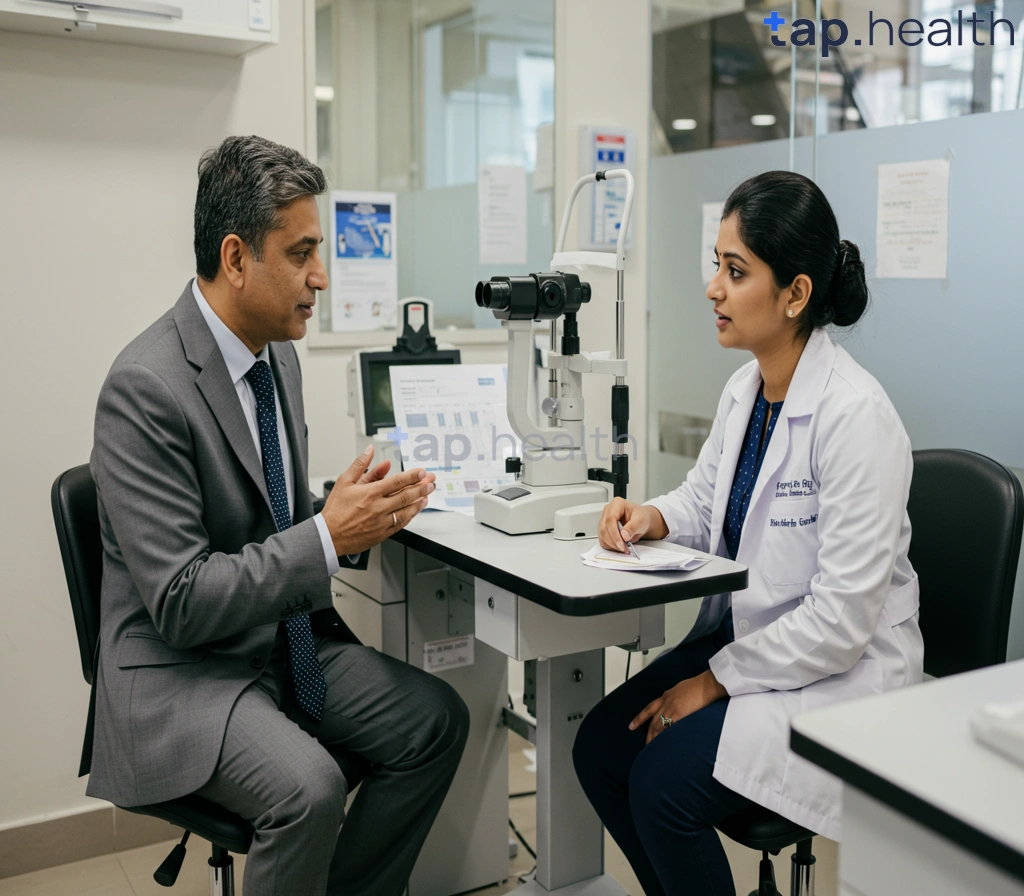Table of Contents
- Diabetes & Vision: Protecting Your Eyesight
- How Diabetes Affects Eyesight: A Complete Guide
- Maintaining Eye Health with Diabetes: Top Tips & Tricks
- Diabetic Retinopathy: Prevention and Early Detection
- Is Your Vision at Risk? Diabetes and Eye Care
- Frequently Asked Questions
- References
Living with diabetes means paying close attention to your overall health, and that includes your vision. Did you know that diabetes is a leading cause of vision loss? This is why Protecting Your Eyesight: A Diabetes Guide to Vision Health is so crucial. In this blog post, we’ll explore the connection between diabetes and eye health, discuss common eye problems associated with the condition, and, most importantly, provide practical tips and advice on how you can safeguard your eyesight. Let’s dive in and learn how to proactively protect one of your most precious senses.
Diabetes & Vision: Protecting Your Eyesight
Diabetes significantly impacts eyesight, and understanding the risks is crucial, especially in India and other tropical countries. A staggering 61% of people with diabetes are aged between 20-64 years, a demographic highly active in their personal and professional lives. This highlights the urgent need for proactive eye care. The impact is even more pronounced considering that 39% of those with diabetes are aged 65+, a population group already facing age-related vision challenges.
Understanding Diabetic Eye Diseases
Diabetic retinopathy, a leading cause of blindness, is a serious complication. High blood sugar damages the blood vessels in the retina, leading to vision loss. Early detection is key. In India and other tropical regions, access to regular eye check-ups can be challenging, making proactive self-care even more vital. This includes diligent blood sugar management through diet, exercise, and medication as prescribed by your doctor.
Protecting Your Vision
Regular eye exams are paramount. Schedule comprehensive eye check-ups at least annually, or more frequently if advised by your ophthalmologist. Maintaining healthy blood sugar levels is the most effective preventative measure. This involves following your doctor’s prescribed treatment plan, including medication and lifestyle changes. A balanced diet rich in fruits, vegetables, and lean protein, combined with regular physical activity, plays a significant role in blood sugar control and overall eye health. Don’t neglect your vision; seek professional help immediately if you experience any changes in your eyesight, such as blurred vision, floaters, or dark spots. For more specific tips on maintaining eye health with diabetes, check out our guide, How to Protect Your Vision with Diabetes: Essential Eye Care Tips.
Taking Action in Indian and Tropical Contexts
In many parts of India and tropical countries, access to specialized eye care might be limited. Therefore, early detection and prevention are even more critical. Find a local ophthalmologist and make regular eye check-ups a priority. Remember, protecting your vision is an investment in your overall well-being and quality of life. Don’t hesitate to seek assistance from your doctor or local diabetes support groups for guidance and resources. If you’re planning any travel, it’s also important to consider Traveling with Diabetes: Essential Tips for a Safe & Healthy Journey to ensure you maintain your health on the go.
How Diabetes Affects Eyesight: A Complete Guide
Diabetes significantly impacts eyesight, increasing the risk of various eye conditions. High blood sugar levels damage the blood vessels in the retina, the light-sensitive tissue at the back of the eye. This can lead to diabetic retinopathy, a leading cause of blindness in India and other tropical countries. Early detection and management are crucial.
Understanding Diabetic Retinopathy
Diabetic retinopathy develops gradually. In its early stages, it may show no symptoms. As it progresses, you might experience blurred vision, floaters (spots or specks in your vision), or difficulty seeing at night. In severe cases, it can cause vision loss or blindness. The prevalence is higher in regions like India, where diabetes is a growing concern. Nearly 30% of individuals with diabetes develop diabetic nephropathy, a kidney disease often linked to worsening eye complications.
Protecting Your Eyesight
Maintaining good blood sugar control is the most effective way to prevent or slow the progression of diabetic retinopathy. Regular eye exams are essential, especially if you have diabetes. Your ophthalmologist can detect early signs and recommend appropriate treatment. In India and other tropical climates, access to regular eye care can be challenging, so proactive management is vital. Adopt a healthy lifestyle including a balanced diet, regular exercise, and managing stress. As you age, managing diabetes becomes even more crucial, so learning more about the challenges and solutions associated with managing diabetes as you age can be beneficial.
Seeking Help in India and Tropical Countries
Regular check-ups with both your diabetologist and ophthalmologist are paramount. Many government and non-government organizations offer affordable or subsidized eye care programs in India and other tropical countries. Don’t hesitate to seek help; proactive care can significantly reduce the risk of vision-threatening complications associated with diabetes. Protecting your eyesight is an investment in your overall well-being. It’s also important to be aware of how diabetes can affect other systems in your body. For example, learn more about the impact on your respiratory system by reading our article on how diabetes affects the respiratory system.
Maintaining Eye Health with Diabetes: Top Tips & Tricks
Diabetes significantly impacts your overall health, including your eyesight. Managing your blood sugar levels is crucial, as high blood glucose can damage the blood vessels in your eyes, leading to serious complications like diabetic retinopathy. This condition can cause vision loss and even blindness if left untreated. In India and tropical countries, where diabetes prevalence is high, proactive eye care is especially vital.
Protecting Your Vision: Practical Steps
Regular eye exams are paramount. Schedule check-ups at least annually, or more frequently if advised by your ophthalmologist. Early detection of diabetic retinopathy allows for timely intervention and better management of the disease. Maintain a healthy lifestyle, including a balanced diet rich in fruits and vegetables, regular exercise, and effective weight management. These lifestyle choices contribute to overall health and help in better blood sugar control, indirectly protecting your vision. For more detailed advice on managing your diabetes effectively, check out our guide: 10 Proven Tips to Effectively Manage Diabetes | Simple Guide.
Addressing Sleep Apnea’s Impact
It’s important to note that diabetes is linked to a 70% increased risk of sleep apnea and related sleep disorders. Poor sleep quality can exacerbate existing health conditions, impacting blood sugar control and potentially accelerating eye damage. Prioritize quality sleep and address any sleep apnea symptoms with your doctor. This holistic approach to managing diabetes extends beyond blood sugar control to encompass your overall well-being, including eye health.
Seeking Expert Care in India and Tropical Countries
In India and other tropical regions, access to quality healthcare can vary. Seek out qualified ophthalmologists and diabetologists for regular check-ups and personalized advice. Don’t hesitate to ask questions and actively participate in your care plan. Protecting your eyesight is an ongoing process, requiring consistent effort and professional guidance. Take charge of your health today and safeguard your vision for a brighter tomorrow. Learning more about effective diabetes management can significantly improve your overall health and eye health; read our article: 10 Proven Tips for Effective Diabetes Management.
Diabetic Retinopathy: Prevention and Early Detection
Diabetic retinopathy is a serious complication of diabetes affecting millions globally, particularly in regions like India and other tropical countries. It’s crucial to understand that diabetes significantly increases your risk of vision problems. In fact, between 30-50% of diabetic patients experience diabetic neuropathy, a nerve damage that can affect many parts of the body, including the eyes, impacting vision and overall quality of life. This highlights the importance of proactive eye care.
Understanding the Risk
Diabetic retinopathy develops when high blood sugar levels damage the blood vessels in the retina, the light-sensitive tissue at the back of your eye. Over time, this damage can lead to vision loss, even blindness, if left untreated. Early detection is key to preventing severe vision complications. Regular eye exams are paramount for those with diabetes, especially in high-risk populations. Factors such as poor blood sugar control and the duration of your diabetes significantly influence your risk. Knowing How Often is Diabetic Eye Screening? is crucial for preventative care.
Protecting Your Sight
Maintaining healthy blood sugar levels is the single most effective way to prevent or delay the onset of diabetic retinopathy. This involves careful management of your diabetes through diet, exercise, and medication as prescribed by your doctor. Regular check-ups are crucial; these allow for early detection of any changes in your retina and prompt intervention. In India and other tropical countries, access to affordable and quality healthcare is key, so it’s important to utilize available resources and seek regular eye examinations. Supplementing a healthy lifestyle with Safe and Effective Dietary Supplements for Diabetes Care can also be beneficial, but always consult your doctor first.
Taking Action
Schedule a comprehensive eye exam with an ophthalmologist immediately. Early detection of diabetic retinopathy can significantly improve your chances of preserving your eyesight. Don’t delay; proactive management is essential for maintaining your vision and overall well-being. Regular monitoring and timely intervention are your best defense against this preventable complication of diabetes.
Is Your Vision at Risk? Diabetes and Eye Care
Diabetes significantly impacts overall health, and unfortunately, eyesight is often a major casualty. Women, in particular, face heightened risks; research indicates they have a 40% higher chance of developing heart disease compared to men with diabetes, highlighting the importance of proactive health management, including diligent eye care. This increased vulnerability underscores the critical need for regular eye exams.
Understanding Diabetic Eye Diseases
In tropical and Indian climates, where certain lifestyle factors and environmental conditions might exacerbate diabetic complications, maintaining optimal eye health is paramount. Diabetic retinopathy, a leading cause of blindness, is a serious concern. This condition damages the blood vessels in the retina, leading to blurred vision, floaters, and eventually vision loss. Early detection is key. Regular eye check-ups are crucial for early diagnosis and treatment.
Protecting Your Sight: Practical Steps
Maintaining healthy blood sugar levels is the cornerstone of preventing diabetic eye disease. This involves diligent adherence to your prescribed diabetes management plan, including medication, diet, and regular exercise. A balanced diet rich in fruits, vegetables, and whole grains, common in many Indian and tropical cuisines, can support overall health and eye health. For more information on the role of nutrition, see our article on Eating for Healthy Vision: Nutrients for Eye Health. Remember to consult your ophthalmologist or diabetes specialist for personalized advice. They can guide you on appropriate eye care strategies specific to your situation.
Taking Action: Prioritize Your Vision
Don’t delay your eye exam. Regular check-ups, often recommended annually or even more frequently depending on your individual risk factors, are essential for early detection and intervention. In India and other tropical countries, access to quality eye care varies; proactively seek out reputable ophthalmologists and make appointments. Your vision is precious – protect it. For those wondering about the broader implications of diabetes, you might find our article on Is Diabetes Considered a Disability? Understanding the Implications helpful.
Frequently Asked Questions on Protecting Your Eyesight: A Diabetes Guide to Vision Health
Q1. How does diabetes affect my eyesight?
Diabetes can damage the blood vessels in your eyes, leading to diabetic retinopathy, a major cause of vision loss and blindness. High blood sugar is the primary culprit.
Q2. What are the early warning signs of diabetic retinopathy?
Early signs may include blurry vision, floaters (spots or specks in your vision), or vision changes. However, sometimes there are no noticeable symptoms, making regular eye exams crucial.
Q3. How can I protect my eyesight if I have diabetes?
Maintaining healthy blood sugar levels through diet, exercise, and medication is key. Regular eye exams are essential for early detection and treatment of any problems.
Q4. How often should I have my eyes checked if I have diabetes?
The frequency of eye exams depends on your individual risk factors and your doctor’s recommendations, but regular check-ups are vital for early detection and prevention of vision problems.
Q5. What should I do if I experience vision changes?
If you notice any changes in your vision, such as blurry vision or floaters, contact your ophthalmologist or diabetologist immediately. Prompt attention is crucial.
References
- A Practical Guide to Integrated Type 2 Diabetes Care: https://www.hse.ie/eng/services/list/2/primarycare/east-coast-diabetes-service/management-of-type-2-diabetes/diabetes-and-pregnancy/icgp-guide-to-integrated-type-2.pdf
- Children with Diabetes : A resourse guide for families and school. : https://www.health.ny.gov/publications/0944.pdf




